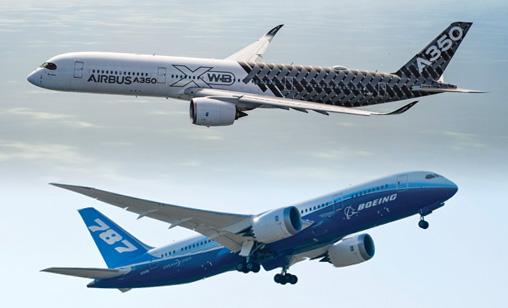News Backgrounder
Airlines will pay price for punitive new tariffs
A 15-year legal battle between unrepentant rivals, Airbus and Boeing, is developing into a bare knuckle trade war with one definite outcome – more expensive aircraft. Associate editor and chief correspondent, Tom Ballantyne, reports.
November 1st 2019
Last month, the U.S. introduced import tariffs on $7.5 billion of European goods. Read More » They included a 10% duty on commercial aircraft manufactured by Airbus, Boeing’s principal competitor. The imposition of the tariffs followed a World Trade Organization (WTO) ruling that Airbus had received discounted European government loans for its big jets, most notably the A380.
And that will not be the end of the matter. In an earlier decision, the WTO decided Boeing also had received illegal subsidies. In early 2020, it will announce tariffs Europe can impose on the U.S. as a result of the WTO ruling on Boeing.
 |
French economy minister, Bruno Le Maire, warned the U.S. action would have serious repercussions. “Europe is ready to retaliate, of course in the framework of the WTO,” he said.
“These decisions will have very negative consequences from both economic and political points of view. Coming on top of the ongoing trade war between the U.S. and China, this new skirmish adds difficulty to an already fragile global economy, including those in Asia.”
The Airbus and Boeing legal battle began in 2004 when the U.S. accused Britain, France, Germany and Spain of providing illegal subsidies and grants to support the production of Airbus products. A year later, the European Union (EU) alleged that from 1989 to 2006 Boeing had received US$19.1 billion in prohibited subsidies from various U.S. government agencies.
In the largest and longest running case the WTO has handled, the U.S. has sought permission to apply tariffs on nearly $11 billion of EU goods. Brussels is arguing for tariffs approaching $10 billion on American goods. The U.S. tariffs go beyond aircraft. They also have been applied to French wine, Scotch whisky, handbags and cheese.
Wine from France, Spain and Germany will attract tariffs of 25%. Germany’s chancellor, Angela Merkel, said the decision would weigh on the European aviation group, one of the country’s largest industrial employers.
For crisis-ridden Boeing, European retaliation for the U.S.tariff decision means its aircraft will be more expensive. Additionally, the EU has opened an “in-depth investigation” into the U.S. group’s 80% acquisition of Brazil’s Embraer commercial aircraft business. The investment is intended to eliminate an important threat to Boeing, the world’s biggest planemaker.
The deal with Embraer is planned to conclude in early 2020, but it could be delayed by this new scrutiny. EU regulators can influence mergers and often can force companies to sell part of their businesses to eliminate anti-trust concerns.
The EU is worried the deal would “remove Embraer as the third largest global competitor” to both Boeing and Airbus, which “may therefore result in higher prices and less choice” for airline customers.
Boeing’s takeover of Embraer’s commercial jet and services business is aimed at widening it’s appeal in the regional jet market via Embraer’s E-Jet family. Importantly, the investment improves its competitive position after Airbus took majority control of Bombardier’s CSeries aircraft, now known as the A220.
European authorities said they did not see any potential rivals from China, Japan or Russia that could replicate Embraer’s competition with Airbus and Boeing in the next five to 10 years. They added the Brazilian company was a “small but important competitive force” for bigger 100-225 seat aircraft. “Despite Embraer’s comparatively small market share, it seemed to exert some price constraint on market leaders, Boeing and Airbus, even beyond the boundaries of the lower 100-150 seats segment,” the EU said.
On the wider U.S.-Europe tariff front, in July EU officials offered to call a truce on subsidies for the airplane makers if both sides would admit fault and curtail state aid. Washington rejected the olive branch.